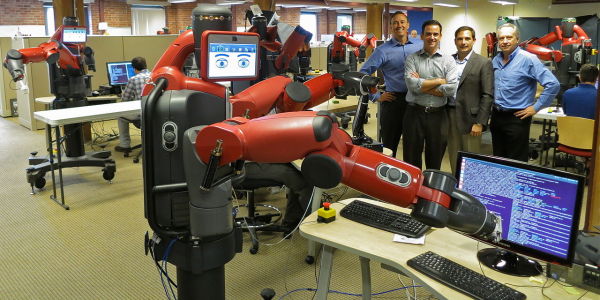Rethink Robotics, the company that brought Baxter to the world, is closing its doors. Baxter was one of the first collaborative robots, or at least one of the first to spark the excitement and lofty expectations. Collaborative robots, or cobots, were supposed to change the way we look at manufacturing. Along with machine learning and IIoT, cobots were going to turn factories into smart factories and usher in Industry 4.0. Baxter’s time has come and gone; what does this say about the future for collaborative robots?
Baxter’s legacy
While originally intended for manufacturing applications, Baxter ended up finding a home in research. The robot helped make significant contributions in research, both robotic and otherwise. Low cost, out-of-the-box readiness, versatility, and most importantly safety made Baxter perfect for researchers, especially those interested in human-robot interaction.
IEEE Spectrum interviewed Rodney Brooks, founder of Rethink Robotics, after news broke that the company was shutting down. Brooks believes that Baxter was a catalyst in shaping the future of industrial robots. Bringing robots “out of the cage”, making them easier to use without extensive training, and making them more accessible to more people in different fields – this is what Baxter pioneered.
What does the future hold for collaborative robots?
So the first collaborative robot is no more. Does that mean that collaborative robots are on their way out? Not at all. There’s still a need for cobots. It’s not that people simply didn’t want cobots like Baxter and his younger brother Sawyer. The collaborative robot market ended up being too competitive, and Rethink was pushed out.
Cobots are safe. They’re affordable. You can buy a cobot for less than it costs to buy a car. They were meant to bridge the gap between human workers and industrial machines. There are things that people can do that industrial robots can’t, and things that industrial robots can do that people can’t. Collaborative robots were meant to safely improving the work that people do. Baxter helped show us that cobots don’t have to be limited to manufacturing.
We’re seeing automation creep into every part of our lives. From restaurants to grocery stores to the cars that we drive – robots are finding new ways to help make our lives easier, more efficient, and better. The affordability, the safety, and the usefulness of cobots means that they’ll be around for a long time.
Make sure that your servos will be around for a long time. Call 479-422-0390 or contact us online for Indramat repair, remanufacturing, maintenance, and service. We can troubleshoot your error codes directly over the phone, and we have charter flights available when you need onsite support fast.



